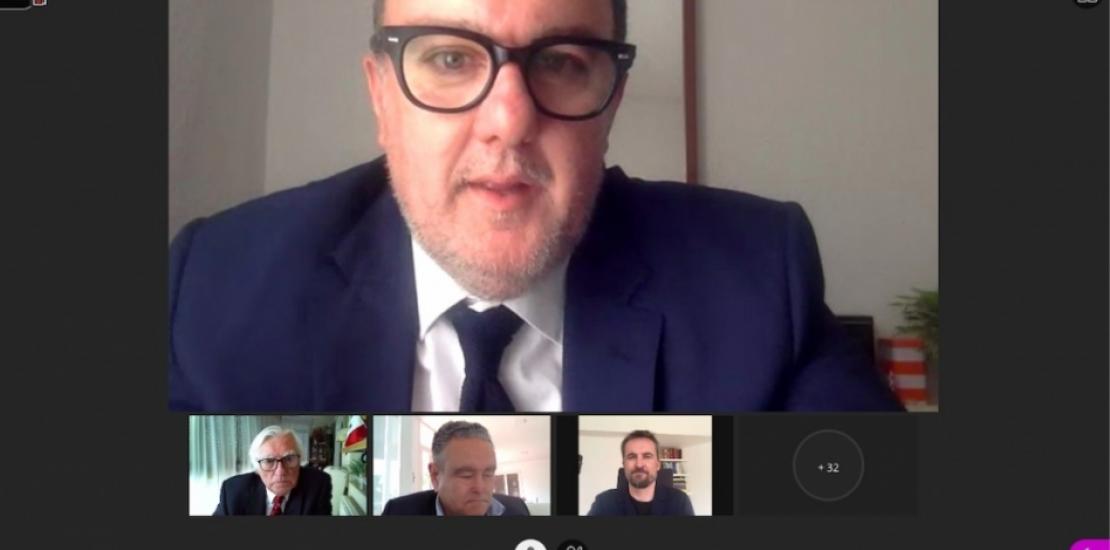UCAM holds its first ‘online’ doctoral thesis defence
Professor Josep Martínez Polo defended his research on collaborative platforms, and UCAM Universidad Católica San Antonio de Murcia set up a virtual environment with two rooms for it, a public one, where the defence took place, and a private one, in which the members of the tribunal consisting of Andrés Pedreño, (Universidad de Alicante), Mikko Villi (Jyväskylä, Finlandia) and Manuel González-Sicilia (UCAM) made their deliberations.<br /> <br />
This event took place online yesterday, as established in the Strategic Plan of Digital Transformation that UCAM implemented with virtual tools and methodologies, which includes the fact of teaching classes to all of its students, exams, seminars, tutoring session, Undergraduate Dissertation (TFG) and Master's Thesis (TFM) defences and the aforementioned Doctoral Theses.
The new scenario has been a challenge for the International Doctoral School of UCAM, which has prepared a virtual environment to guarantee that the first ‘online’ thesis defence of its history was developed with complete normality and by complying with the quality and safety requirements established by the Spanish legislation.
The session of public defence, to which it was possible to access freely, was seen, in different moments of the event, by more than fifty persons. Only the members of the tribunal accessed the other room, which was private, firstly to establish the tribunal and then to deliberate and to establish a mark for the work.
The vice-chancellor for Research of UCAM, Estrella Núñez, said that the thesis defence took place “with complete normality; the members of the Tribunal connected from Finland, Alicante and Murcia, as well as the public who wanted to attend the event. The vice-chancellor adds that “a new era has begun in which it is possible to hold this type of events in different temporal and physical spaces”.
The collaborative digital platforms, main topic of the first ‘online’ thesis
Josep Manuel Martínez Polo, teacher at the Faculty of Social Sciences and Communication of UCAM, has been the first doctor appointed by this university who defends his thesis in ‘online’ modality. ‘Confianza y reputación online en los usuarios de plataformas digitales colaborativas de acceso compartido y bajo demanda’ [Trust and online reputation among users of collaborative digital platforms with shared access and on demand] is the title of the Thesis, in which he has highlighted that “reputation is a dynamic property, which can be obtained or lost based on the results of behaviour when interacting with others and it is not a coin, is does not get worn out by use, but it rather puts itself at risk, and it does not have a limited capacity”.
The new doctor highlighted as well that “users make trust-based decisions on the basis of their prior experience, of others’ experiences, on the comments and ratings of the people or online profiles they trust in. These trust-based decisions are also made based on the brand or the prestige of the digital platform and of perceived factors such has its honesty, benevolence and competence. The online reputation will be the measure that indicates if a person can be trusted as the 21st century progresses”.
Likewise, Martínez pointed out that “only in Spain there is more than 400 platforms that belong to the digital ecosystem, which should take care of its users, protect their rights and favour an environment that promotes the development of efficient, honest and legal reputation and trust mechanisms”.
“The platforms that I have studied were created by innovators and they started to be used by early adopters to later become known and used by the vast majority of users. They are mostly global and they resolve problems or needs of the consumers, hence their success as a phenomenon. In the mind of the consumer and of the many experts, almost always the same ones appear (Uber, Airbnb, Glovo, Deliveroo, BlaBlaCar) and, generally, the winner takes it all, but in the thesis, I include more than 400 digital platforms that will compete for the user's attention. And new projects that no one sees coming and that are disruptive keep arising. In my case, any project related to education has my attention”, concludes the new doctor.




